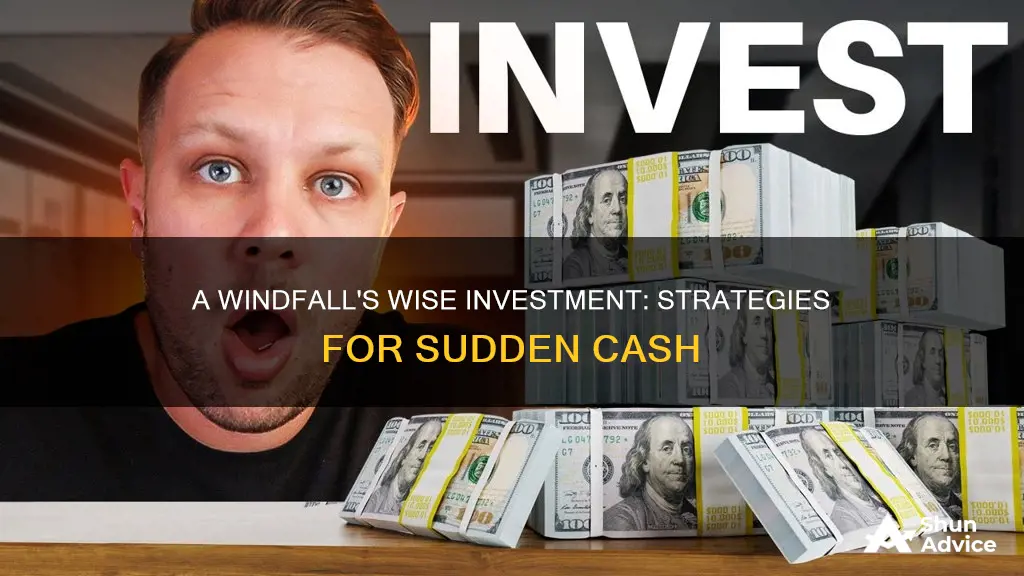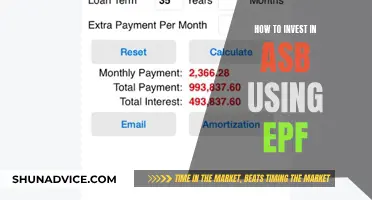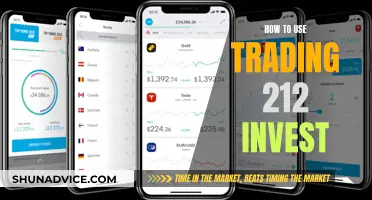
Receiving a cash windfall can be life-changing, but it's important to manage the money wisely. While it may be tempting to treat it as disposable income, investing it can help you achieve greater financial security in the long run. Here are some steps to help you make the most of your windfall:
- Determine the tax implications: Consult a tax professional to understand if the money is taxable and set aside funds to cover any taxes owed.
- Consider different payout options: Opting for monthly or annual payments instead of a lump sum can curb the temptation to overspend and may help with tax liability.
- Set aside a small portion for fun: Allocate a small percentage (around 10%) of the windfall for your enjoyment.
- Create a financial plan: Work with a financial advisor to create or adjust your financial goals and determine how to allocate your windfall accordingly.
- Pay off debt: Use the windfall to eliminate any high-interest debt, such as credit card balances.
- Build an emergency fund: Set aside enough money to cover living expenses for three to six months in a high-yield savings account.
- Invest wisely: Choose quality mutual funds or passive index funds with a good track record, low fees, and aligned with your risk tolerance.
- Save for specific goals: Consider using a portion of the windfall for significant purchases, such as a down payment on a home or your children's education.
- Avoid impulsive decisions: Take your time and avoid making hasty decisions. Give yourself time to adjust emotionally and seek professional advice when needed.
| Characteristics | Values |
|---|---|
| First steps | Stay calm, don't make hasty decisions, and set aside money for living expenses |
| Tax implications | Consult a tax professional to determine tax liability and set aside money to cover taxes |
| Payout options | Consider taking the money in monthly or annual payments to curb the temptation to splurge |
| Fun money | Set aside a small portion (generally no more than 10%) of the windfall for fun or entertainment |
| Financial plan | Create or adjust your financial plan to incorporate the windfall |
| Estate plan | Create or update your estate plan to ensure your money is distributed according to your wishes |
| Debt payments | Use the windfall to pay off high-interest debt |
| Emergency fund | Build an emergency fund of 3-6 months' worth of living expenses in a high-yield savings account |
| Investments | Choose quality mutual funds with a good earnings track record and low fees, or opt for passive index funds |
| Home ownership | Consider using the windfall for a down payment on a home or investing in real estate |
| Financial responsibilities | Plan with the financial responsibilities of any dependents in mind |
What You'll Learn

Pay off high-interest debt
If you've come into a cash windfall, one of the smartest things you can do is pay off any high-interest debt. This can include credit card debt or a car loan. The longer you hold onto this kind of debt, the more you will pay, so it's best to pay it off as soon as possible.
High-interest debt is likely to be costing you more than almost any investment would be making you. For example, if you have credit card debt at 20%, you would be better off putting your extra cash towards paying that off rather than investing it. The average interest rate on credit cards is over 24%, and few investments can match that rate of return.
If you decide to pay off your high-interest debt, start with the debt with the highest interest rates first and work your way down. This is known as the debt avalanche method and can help you save the most money on interest and pay off your debt faster.
Another method is the debt snowball, which involves paying off the debt with the smallest balance first while making minimum payments on the rest. This can help build momentum and motivation as you see your debts disappear one by one.
If you have a lot of debt, you could also consider the debt consolidation method, which involves taking out a new loan with a lower interest rate and using it to pay off multiple debts at once. This can help simplify your payments and lower your monthly payment.
Whatever method you choose, make sure you have a realistic budget that allows you to pay off your debt without compromising your other financial goals or needs. Getting out of high-interest debt can save you money, improve your credit score, and free up cash flow for other purposes.
Computing Net Proceeds: Investing Cash Flow Explained
You may want to see also

Create an emergency fund
Receiving a cash windfall can be exciting, but it's important to use it wisely. One of the best ways to do this is to create an emergency fund to protect yourself from unexpected financial shocks. Here are some detailed steps to help you create an emergency fund:
Understand the importance of an emergency fund
An emergency fund is a crucial financial safety net that can help you weather unexpected expenses or financial setbacks. It ensures you're prepared for unforeseen events, such as medical issues, car problems, or job loss, which could otherwise devastate your finances. By having an emergency fund, you can avoid relying on high-interest loans or credit cards, protecting your long-term savings and giving you peace of mind.
Determine how much to save
The amount you need in your emergency fund depends on your financial situation, including your monthly income, dependents, and monthly bills. A good rule of thumb is to save three to six months' worth of living expenses, separate from your regular checking account. If you're the sole earner in your household, you may want to save even more. Setting a clear savings goal will help you stay motivated and track your progress.
Choose the right type of account
Typically, emergency funds are kept in bank accounts that offer interest and easy access to your money. High-yield savings accounts or money market accounts can be ideal as they often provide higher interest rates and are generally protected by the Federal Deposit Insurance Corporation (FDIC). It's important to keep your emergency fund separate from your everyday spending accounts to avoid temptation and accidental spending.
Start building your fund
Open the savings account you've chosen and begin transferring funds. If you receive a windfall, consider adding a portion of it to your emergency fund. You can also set up direct deposits or automatic monthly transfers from your checking account to build your savings over time. Even if you can only save a small amount each month, it's important to start as soon as possible.
Know when to use it
Your emergency fund should only be used for true emergencies, such as job loss, medical emergencies, major car or home repairs, or other unforeseen expenses. Set clear guidelines for what constitutes an emergency, and remember that unplanned expenses can happen at any time. If you do use your emergency fund, make sure to replenish it as soon as possible so you're prepared for the next unexpected event.
Cashing in on Investments: A Meryl Lynch Guide
You may want to see also

Invest in passive index funds
Passive index funds are a great way to invest an unexpected windfall quickly. If the money you received was unplanned, it's likely that all your expected expenses are already taken care of.
Passive investing is an investment strategy that aims to maximise returns by minimising the costs of buying and selling securities. It is typically done by investing in a mutual fund or exchange-traded fund (ETF) that mimics the index's holdings. This strategy is called passive investing because the managers who use it do not need to actively hunt for investments; they simply buy and sell the investments that their target benchmark trades.
Index investing is perhaps the most common form of passive investing. With it, investors seek to replicate and hold a broad market index or indices. Passive investment is less expensive and complex than active management, and it often produces superior after-tax results over medium to long time horizons.
- Lower fees: Relying on rigid formulas to pick securities eliminates costly research, so index funds tend to be less expensive to operate than actively managed funds.
- Transparency: It's clear which assets are in an index fund.
- Tax efficiency: Index funds that use a buy-and-hold strategy typically generate low or no taxable capital gains annually for shareholders.
- Simplicity: Owning an index, or group of indices, is far easier to implement and understand than a dynamic strategy that requires constant research and adjustment.
However, there are also some drawbacks to passive investing:
- Lack of flexibility: Passive funds are limited to a specific index or predetermined set of investments, and investors are locked into those holdings regardless of market changes.
- Smaller potential returns: Passive funds rarely beat their index and usually return slightly less due to operating costs.
When investing in passive index funds, it's important to have a clear goal in mind and to research different funds to ensure you're selecting a fund type that is right for you, with good performance and low fees.
Cash is Not King: Exploring Investment Alternatives
You may want to see also

Save for retirement
If you've been lucky enough to receive a cash windfall, it's important to take a step back and assess your financial situation before making any hasty decisions.
A windfall can be life-changing, and it's crucial to manage it wisely. Here are some detailed, direct, and instructive tips for saving a cash windfall for retirement:
Take a Pause
Don't make any impulsive decisions. Give yourself time to adjust emotionally and psychologically to your new situation. This pause will help you avoid rash behaviour and allow you to create a thoughtful plan for your windfall.
Assess Your Financial Situation
Gather your financial documents, including bills, bank statements, credit card bills, loan documents, etc. Know your monthly expenses and cash flow to better manage and preserve your wealth.
Prioritise Retirement Savings
If you have access to a 401(k) plan or a similar workplace retirement option, consider maximising your contributions with a portion of your windfall. If you don't already participate, now is the time to start. Your contributions are pre-tax, reducing your taxable income, and many companies will match your contributions up to a certain amount.
Consider Individual Retirement Accounts (IRAs)
If you've maxed out your 401(k) or want additional tax-advantaged options, look into IRAs. For 2019, individuals under 50 could contribute up to $19,000 to their 401(k) and $6,000 to a Roth IRA. If you're 50 or older, you're allowed to make "catch-up" contributions to these accounts.
Weigh the Benefits of a Health Savings Account (HSA)
If you're enrolled in a high-deductible health plan, consider saving for retirement through an HSA. These accounts offer a triple tax benefit: tax-deductible contributions, tax-free growth, and tax-free withdrawals for qualified medical expenses.
Consult a Financial Professional
Consider seeking advice from a certified financial planner or advisor. They can help you navigate the complexities of investing, taxes, and retirement planning to ensure you make the most of your windfall for your retirement years.
Remember, it's important to take your time, do your research, and seek professional guidance when necessary to make informed decisions about saving for retirement with your cash windfall.
Understanding Net Cash Flow from Investing Activities
You may want to see also

Invest in education
Investing in education is one of the best ways to use a cash windfall. It is an underrated investment that can create unimaginable returns. Learning a new skill is something that can never be taken away from you, and you can put that knowledge to use immediately.
Online Courses and Education Tools
When investing in education, it is important to choose reputable and high-quality courses or tools that will provide you with valuable skills or knowledge. Be sure to complete the course to get the full benefit of your investment. There are many online platforms that offer a wide range of courses on various topics, from coding to marketing to personal finance. You can also invest in education tools such as language-learning apps, stock market simulators, or other resources that can enhance your learning experience.
Formal Education
Consider using your windfall to fund a degree or certification program. This could be an opportunity to pursue a new career path or advance your current one. Many universities and colleges offer part-time or online programs that can provide flexibility if you are working or have other commitments. You can also look into scholarship programs or financial aid to stretch your windfall further.
Workshops, Conferences, and Networking Events
In-person educational events can be a great way to learn from industry experts and connect with like-minded individuals. Workshops and conferences often provide hands-on learning experiences and the opportunity to build a professional network. These events can range from local workshops to international conferences, so you can choose the ones that align with your interests and budget.
Books and Educational Resources
Investing in books and educational resources can be a cost-effective way to expand your knowledge. Consider purchasing books on personal finance, investing, or other topics that can help you make informed financial decisions. You can also subscribe to relevant magazines or online platforms that offer exclusive content and insights.
Education for Family Members
You can also use your windfall to invest in the education of your family members, such as your children or grandchildren. This could include funding their college education, extracurricular activities, or other learning experiences. You can set up education savings plans or trusts to ensure the funds are used for their intended purpose.
Remember, when investing in education, it is important to do your research and choose options that align with your goals and interests. This investment can not only enhance your knowledge and skills but also potentially lead to new career opportunities and increased earning potential.
Corporations' Cash Investment Strategies: Unlocking Business Growth
You may want to see also
Frequently asked questions
It's important to stay calm and avoid making any hasty decisions. Set aside money to cover your living expenses for at least six months and up to a year, and place the rest of the windfall into low-risk investments such as FDIC-insured accounts, money market funds, or treasury bills. This gives you time to process any emotional or social issues associated with the windfall and create a financial plan.
Common mistakes include quitting your job, buying expensive items such as luxury cars or properties, making risky investments, and being too generous with your money. It's important to be cautious and thoughtful with your windfall to avoid losing it.
After setting aside money for living expenses, consider paying off any high-interest debt and then build an emergency fund. When investing, choose passive investing in a broadly diversified portfolio of index funds that represent multiple asset classes. You may also want to put some of the windfall into a sacred account dedicated solely to wealth-building.







